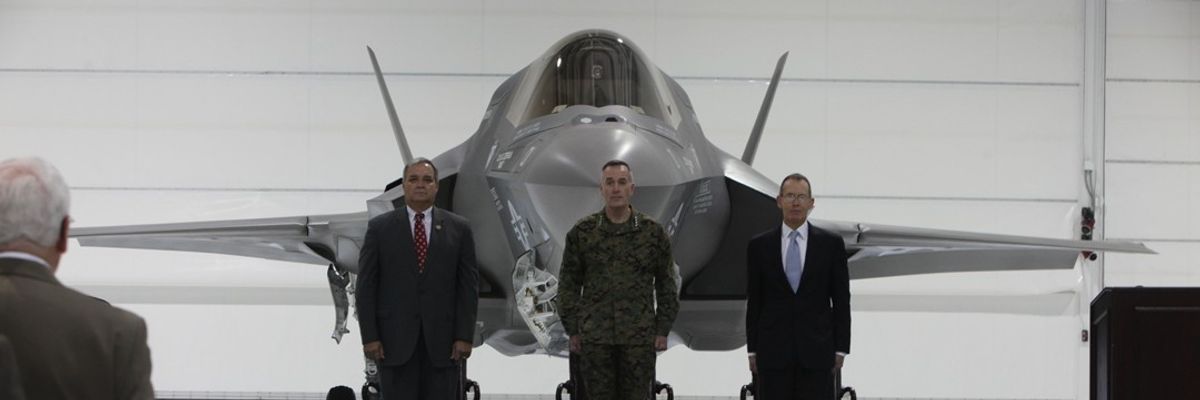At a time when the Pentagon budget is soaring towards $1 trillion per year and debates about how to respond to the challenges posed by Russia and China are front and center, it is more important than ever to make an independent assessment of the best path forward.
Ideally, this would involve objective analysis by unbiased experts and policy makers grounded in a vigorous public conversation about how best to defend the country. But more often than not, special interests override the national interest in decisions on how much to spend on the Pentagon, and how those funds should be allocated.
One practice that introduces bias into the shaping of defense policy is the revolving door between the U.S. government and the weapons industry. The movement of retired senior officials from the Pentagon and the military services into the arms industry is a longstanding practice that raises serious questions about the appearance and reality of conflicts of interest. Mostly because employing well-connected ex-military officers can give weapons makers enormous, unwarranted influence over the process of determining the size and shape of the Pentagon budget.
A 2021 report by the Government Accountability Office found that 1,700 senior government officials had taken positions in the arms industry over a five year period, an average of well over 300 per year. And a new report from our organization, the Quincy Institute for Responsible Statecraft, found that this practice is particularly pronounced among top generals and admirals. In the past five years, over 80% of retired four-star generals and admirals (26 of 32) went on to work in the arms sector as board members, advisers, lobbyists, or consultants.
For example, Boeing recruited the former Chief of Naval Operations Admiral John Richardson following his retirement from government service. The admiral joined the company’s board of directors within two months of his retirement ceremony. Boeing was the Pentagon’s sixth largest contractor in Fiscal Year 2022, with total prime contracts awards amounting to $14.8 billion.
Another prominent example of a four-star officer going to work for a top contractor is retired Marine Corps General Joseph Dunford, who served as chairman of the Joint Chiefs of Staff before he retired in September 2019. Five months later Dunford joined the board of directors of Lockheed Martin.
The most recent batch of retired four-stars are not only seeking employment with the big contractors, they are also branching out to work for small and mid-size companies that focus on cutting edge technology, like next-generation drones, artificial intelligence (AI), and cybersecurity.
For example, the former head of Africa Command, General Stephen Townsend (U.S. Army, Ret.), joined a company called Fortem Technologies, which is dedicated to airspace awareness and defense against drones. General Mike Murray, former head of the U.S. Army Futures Command, went onto the boards of three emerging defense tech firms — Capewell, Hypori, and Vita Inclinata. And both former Chief of the National Guard Bureau head Gen. Joseph L. Lengyel and former Vice Chief of Naval Operations Adm. William K. Lescher went to work for AI firms upon leaving government service.
If past experience is any guide, this new influx of former military officials into the arms sector will distort Pentagon spending priorities and promote higher military budgets than would be the case absent their influence on behalf of their corporate employers.
As documented in our new report and in prior analyses by the Project on Government Oversight, there are numerous examples of senior military officials who have advocated for dysfunctional weapons while in government and then gone on to work for the companies that produced those systems. In addition, former military officers have played central roles in preventing the Pentagon from divesting itself of weapons it no longer wants or needs, like the overpriced, underperforming, and strategically unnecessary Littoral Combat Ship. The prevalence of this kind of activity is hard to track because of the limited information available about what retired military officers do once they join the arms industry.
The most comprehensive proposal for addressing the problem of the revolving door is Sen. Elizabeth Warren’s “Department of Defense Ethics and Anti-Corruption Act,” which includes a number of the measures outlined below.
At a minimum, to limit the undue influence of retired four-stars and the potential conflicts of interest that result from the post-service employment of former military officers, the following measures should be taken:
- Bar four-star officers from going to work for companies that receive $1 billion or more in contracts with the Pentagon annually.
- Extend “cooling off periods” before retired officials can go to work for the arms industry to four years. This would ensure that key contacts or key information that the official may have been privy to while serving would not provide an outsized advantage.
- Increase transparency through accurate reporting on the post-government employment of retired military officials, including a requirement that defense contractors report their interactions with relevant government officials.
- Expand the definition of lobbying. Current lobbying restrictions and laws allow consultants, board members, and other corporate officials to act as advocates for the arms industry without being defined as lobbyists, thereby allowing them to avoid relevant restrictions that would otherwise apply.
There’s too much at stake, both in taxpayer dollars and our future security, to let conflicts of interest and special interest politics shape the Pentagon budget. The time for Congress to act to reduce the influence of the revolving door is now.
- Frank Kendall flies out of revolving door and into Air Force confirmation ›
- This is not your grandparents' military industrial complex ›
- The US military is embedding its officers in corporate America | Responsible Statecraft ›
- Witnesses backed by military, foreign $$ hype war with Iran | Responsible Statecraft ›
- The military showers universities with hundreds of millions of dollars | Responsible Statecraft ›
- Yes, US generals should be fired | Responsible Statecraft ›
- 4-star Admiral gets whacked by the revolving door | Responsible Statecraft ›
- Bipartisan bill seeks to put arms sales lobbyists on ice for 3-years | Responsible Statecraft ›
- Bidenites make soft landing in heart of lucrative war industry | Responsible Statecraft ›
















